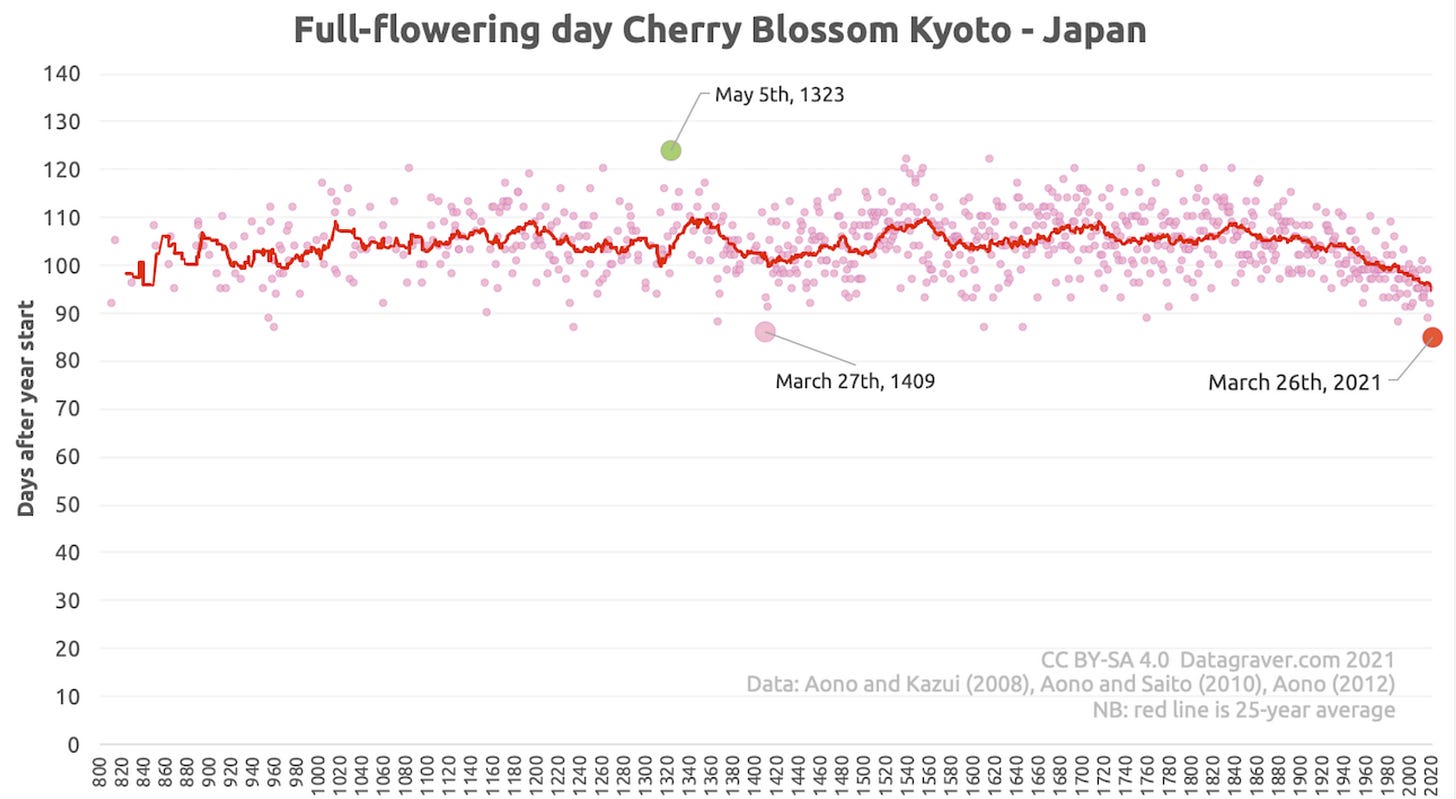Links
3 stars
The Secret of Synchronization | Kottke
What do swaying bridges, flashing fireflies, clapping audiences, the far side of the Moon, and beating hearts have in common? Their behavior all has something to do with synchronization. In this video, Veritasium explains why and how spontaneous synchronization appears all the time in the physical world.
2 stars
Welcome to the Decade of Concern | The Scholar’s Stage
The 2020s do not look good. […]
Defense planning talk can lead eyes to glaze over. Little surprise! Debates over this topic quickly get bogged down with acronyms, accounting terms, and references to opaque production and planning cycles. One helpful way for ordinary citizens get a handle on these issues—at least, for ordinary citizens of my generation—is to think of defense planning as bit similar to a real time strategy (RTS) computer game, like Warcraft or Age of Empires. Games of that sort force the player to decide how they will spend constrained resources. […]
Thus for three decades America traded out modernization and longer-term force structure procurement for the sake of maintaining readiness and battlefield operations. The long wars forced some of this trade off on the services (cue Eaglen: “Today, the US military is in the middle of a future that was mortgaged to pay for the wars of yesterday”), but political foolishness played just as large a part. The thing to emphasize here are the long term consequences of poor decision making by national elites. As procurement and development programs run so long, mistakes made in 2003 or 2013 reverberate decades later. Today we the enter the 2020s with a military built during the 1980s.
Debranding Is the New Branding | Bloomberg
From Burger King and Toyota to Intel and Warner Brothers, major brands are discarding detail and depth. Why now, and what’s the rush?
Misdemeanor Prosecution | Marginal Revolution
Misdemeanor Prosecution is a new, blockbuster paper by Agan, Doleac and Harvey (ADH). Misdemeanor crimes are lesser crimes than felonies and typically carry a potential jail term of less than one year. Examples of misdemeanors include petty theft/shoplifting, prostitution, public intoxication, simple assault, disorderly conduct, trespass, vandalism, reckless driving, indecent exposure, and various drug crimes such as possession. Eighty percent of all criminal justice cases, some 13 million cases a year, are misdemeanors. ADH look at what happens to subsequent criminal behavior when misdemeanor cases are prosecuted versus non-prosecuted. Of course, the prosecuted differ from the non-prosecuted so we need to find situations where for random reasons comparable people are prosecuted and non-prosecuted. Not surprisingly some Assistant District Attorneys (ADAs) are more lenient than others when it comes to prosecuting misdemeanors. ADH use the random assignment of ADAs to a case to tease out the impact of prosecution–essentially finding two similar individuals one of whom got lucky and was assigned a lenient ADA and the other of whom got unlucky and was assigned a less lenient ADA. […]
Did you get that? On a wide variety of margins, prosecution leads to more subsequent criminal behavior. How can this be?
Yes, experts will lie to you sometimes | Noahpinion
In other words, economists believed that if they told the public the complex truth, they’d be activating deep-seated irrationalities among the hoi polloi. Instead of revealing what econ really says about free trade — that it offers huge opportunities but also real dangers and drawbacks — they decided to push a simplified fable in order to push back against what they saw as society’s innate tendency toward protectionism. They decided America couldn’t handle the truth.
And to be fair to the economists here…were they wrong? When the free trade consensus among policymaking elites finally collapsed, it came not in the form of subtle nuanced thinking; it came in the form of Donald Trump. Trump did all the dumb and dangerous stuff that economists were so afraid of — he railed against foreigners, he started fights with allies, he resorted to tariffs that ended up hurting U.S. consumers, and he failed to bring jobs back to America or save American manufacturing. It was exactly what Mankiw feared.
But that might not justify the deception. Had economists been up front about the nuances and complexities and uncertainties of trade policy from day one, smart policymakers might have been able to get a head start on crafting smart ways to minimize the risks and harms. Instead, when the break with free trade came, it came in the form of a belligerent xenophobic idiotic populist, because that was the only person who could break through the complacent pro-free-trade consensus that economists’ reassurances had created among the American elite. Maybe it didn’t have to be that way.
March 28, 2021 | Letters from an American
So white southerners determined to prevent Black participation in society turned to a new tactic. Rather than opposing Black voting on racial grounds—although they certainly did oppose Black rights on these grounds—they complained that the new Black voters, fresh from their impoverished lives as slaves, were using their votes to redistribute wealth.
To illustrate their point, they turned to South Carolina, where between 1867 and 1876, a majority of South Carolina’s elected officials were African American. To rebuild the shattered state, the legislature levied new taxes on land, although before the war taxes had mostly fallen on the personal property owned by professionals, bankers, and merchants. The legislature then used state funds to build schools, hospitals, and other public services, and bought land for resale to settlers—usually freedpeople—at low prices.
White South Carolinians complained that members of the legislature, most of whom were professionals with property who had usually been free before the war, were lazy, ignorant field hands using public services to redistribute wealth.
Fears of workers destroying society grew potent in early 1871, when American newspaper headlines blasted the story of the Paris Commune. From March through May, in the wake of the Franco-Prussian War, French Communards took control of Paris. Americans read stories of a workers’ government that seemed to attack civilization itself: burning buildings, killing politicians, corrupting women, and confiscating property. Americans worried that workers at home might have similar ideas: in italics, Scribner’s Monthly warned readers that “the interference of ignorant labor with politics is dangerous to society.”
Bidenomics, explained | Noahpinion
By now I think everyone has realized that something is changing in American economic policy. The tenor, pace, and scope of Biden’s economic programs proposals, and the muted nature of the ideological opposition, suggest that we’ve entered a new policy paradigm — much as when FDR took office in 1933 or Ronald Reagan in 1981. Every President comes in with a laundry list of initiatives, but once every few decades a President comes in with a new philosophy for what policy should look like. And that is happening now. The fact that a $1.9 trillion COVID relief bill was passed with relatively little fuss, and was really just the warm-up to an even bigger infrastructure bill, and that other “big” policies like student debt cancellation are being pursued on the side as an afterthought, should make it clear that Biden is blitzing.
But what’s the unifying philosophy here? What is Bidenomics? I have some thoughts. First, we need to talk a bit about why the old paradigm wasn’t working.
The forgotten medieval fruit with a vulgar name | BBC
Medieval Europeans were fanatical about a strange fruit that could only be eaten rotten. Then it was forgotten altogether. Why did they love it so much? And why did it disappear?
Why Joe Manchin Is So Willing And Able To Block His Party’s Goals | FiveThirtyEight
Senate Democrats need all 50 members of their caucus to band together to pass bills that don’t have any GOP support. So, in theory at least, any senator could constantly force the party to bend to their will.
In reality, though, only Sen. Joe Manchin of West Virginia is using that power. […]
He can because no Democratic senator is less beholden to the party than the senior senator from West Virginia. He wants to because he seems to have different goals and political values than many others in the party.
1 star
Stop Motion Lego Chocolate Cake | Kottke
Watch as YouTuber tomosteen makes a Lego chocolate cake out of Lego ingredients, from cracking the eggs to the frosting on top. The little details here are *chef’s kiss*: the transitions from food to Lego brick, the way the chocolate bar breaks imperfectly, the little peaky dollop left after piping the chocolate frosting out of the pastry bag.
Ted Chiang: Fears of Technology Are Fears of Capitalism | Kottke
Let’s think about it this way. How much would we fear any technology, whether A.I. or some other technology, how much would you fear it if we lived in a world that was a lot like Denmark or if the entire world was run sort of on the principles of one of the Scandinavian countries? There’s universal health care. Everyone has child care, free college maybe. And maybe there’s some version of universal basic income there.
Now if the entire world operates according to — is run on those principles, how much do you worry about a new technology then? I think much, much less than we do now. Most of the things that we worry about under the mode of capitalism that the U.S practices, that is going to put people out of work, that is going to make people’s lives harder, because corporations will see it as a way to increase their profits and reduce their costs. It’s not intrinsic to that technology. It’s not that technology fundamentally is about putting people out of work.
It’s capitalism that wants to reduce costs and reduce costs by laying people off. It’s not that like all technology suddenly becomes benign in this world. But it’s like, in a world where we have really strong social safety nets, then you could maybe actually evaluate sort of the pros and cons of technology as a technology, as opposed to seeing it through how capitalism is going to use it against us. How are giant corporations going to use this to increase their profits at our expense?
Here's The Disastrous Path The 'Ever Given' Cargo Ship Took Before Getting Stuck In The Suez Canal | Digg
Someone tracked the path that the doomed Ever Given cargo ship took before running aground in the Suez Canal.
Kyoto Cherry Blossom Full Flower Dates | Datagraver
Since the year 812 people in Japan have recorded the first day in the year the Cherry Blossom was in full bloom in Kyoto. Based on this record you can see some of the local climate effects.










